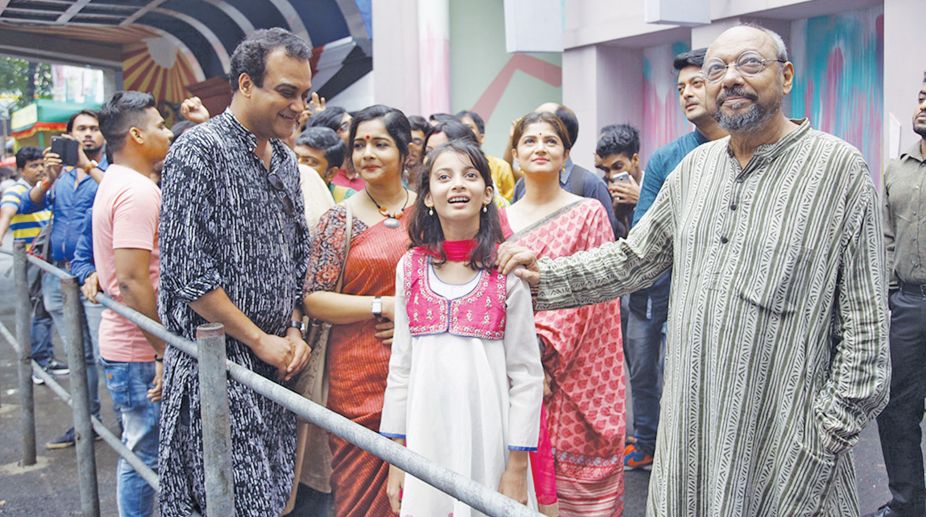Randeep Hooda opens up on next directorial: Maybe I will now make an action film
Randeep Hooda shared that he won't confine himself to one theme and will explore various genres.

A still from Uma.
It is one thing to adapt a real-life experience in Canada to a local setting to underline the enduring appeal of spiritual triumph. It is something else to extend the reality beyond the limits of a credible fantasy simply to recreate an emotional response to the forces of despair.
In some of his recent films, Srijit Mukherjee has been seen to be twisting the truth to a point where the original becomes somewhat irrelevant. In this case, he needs to explain whether Uma has been inspired by a touching narrative imported from a different cultural background with some conviction or whether he intends to use of the tragedy of a terminal illness to explore multifarious facets of social and human conduct.
The confusion reconfirms his credentials as a filmmaker who thrives on imaginative excesses. One can assume that the story of a mother who had created a Christmas for her dying son much ahead of the season of carols echoing from churches was no more than an intensely personal experience.
Advertisement
On the other hand, the filmmaker with a creative energy that challenges the sensibilities of a thinking audience chooses to inflict all the colours he possibly could on the original. In the process, the tragedy of an NRI flying down to Kolkata for a premature celebration of a fake Durga Puja for the benefit of a daughter, given a few months to live, is relegated to a virtual sub-plot. This is a director trying to be as inventive in his story telling methods as he claims to be in his cinematic ideas. Since the material was woefully thin, he may have had no option but to pile on the absurdities that rob the film of its core appeal.
The story begins with a single parent in Switzerland defying all the hurdles to give his daughter a few days of happiness and ends with a contrived congregation at the ghat in Kolkata. It suggests the success of a spiritual journey. But between the relentless images of hope rising above adversity and calm reflections on the truth is a gulf that the director doesn’t even try to bridge.
He assumes that viewers have come with the single-minded objective of tracing the emotional journey through all the social and human complexities. In the process, they would probably lose track of the primary inspiration — the enduring human bond that justified the connection between the festivals in Canada and Kolkata — and slip into a concocted world of harshness transformed into happiness with an embarrassing sense of self-assurance.
This clearly is a film that doesn’t invite an application of the mind. What it does instead is to divert the mind towards a wild array of non-issues. The director props up a queer narrative to sustain the emotional journey. In the process, Anjan Dutt, playing a director who calls himself a “successful failure”, grabs a large chunk of the screenplay.
This is partly because the father and daughter who have arrived in Kolkata have virtually exhausted their contribution to the drama. Jishu Sengupta, the father, has a marginal presence while the attention shifts to the director who first spurns the idea and then proceeds to create the ambience of a false puja at a housing complex.
Dutt is a competent actor landed with an impossible role. He tries to redeem himself through unattached clips like the one with his mentor (Manoj Mitra) lying on a sick bed and the ones with the women he has wronged. But it is a lost cause. Mitra is a powerful actor whose contribution is one of the many bits that make no difference to the whole.
It gets worse when the screenplay reaches out to false conflicts — false because the outcome is so predictable. This is a pity because the film deals with powerful actors like Anirban Bhattacharya, one of the dissenters in the housing complex where the fake puja is organised, and Rudranil Ghosh, the production manager whose heart, quite improbably, is in the right place. This is not the case with Babul Supriyo who does a cameo that is a bizarre lift from the worst kind of mainstream entertainment.
All this means that the plot has to be driven through bits and pieces of mindless thrills. Not that it is wholly divested of intimate and lovable moments. The child, played by Sara Sengupta, has a relatively minor presence that is lively to the point of being prodded into precociousness. Jishu is more assured but, again, without the scope for making a strong contribution. The tragedy is that the film’s most vital element is lost in the maze of spurious thrills.
One reason for this could be that Srijit Mukherjee is determined to present himself as a director with a difference. It goes horribly wrong in this case. Fortunately, he has persisted with the singer Anupam Roy but then again, the songs with their lingering warmth may have to be enjoyed in isolation.
Otherwise, Uma may finally be seen to be missing the finer touches that underline the director’s creative capabilities. The desperate effort to spring the surprise of popular faces confirms the weaknesses that are more glaring in Uma than in his recent films. The passing shots of the Swiss landscape cannot redeem the overall disappointment.
Advertisement